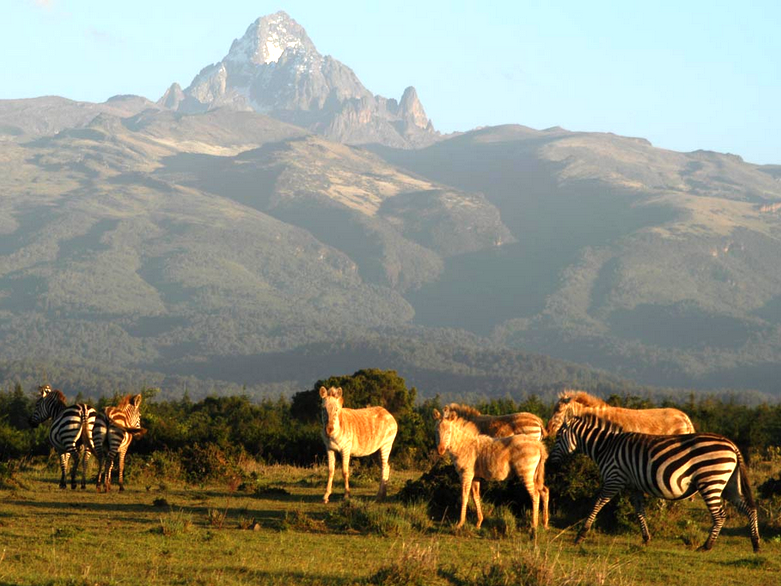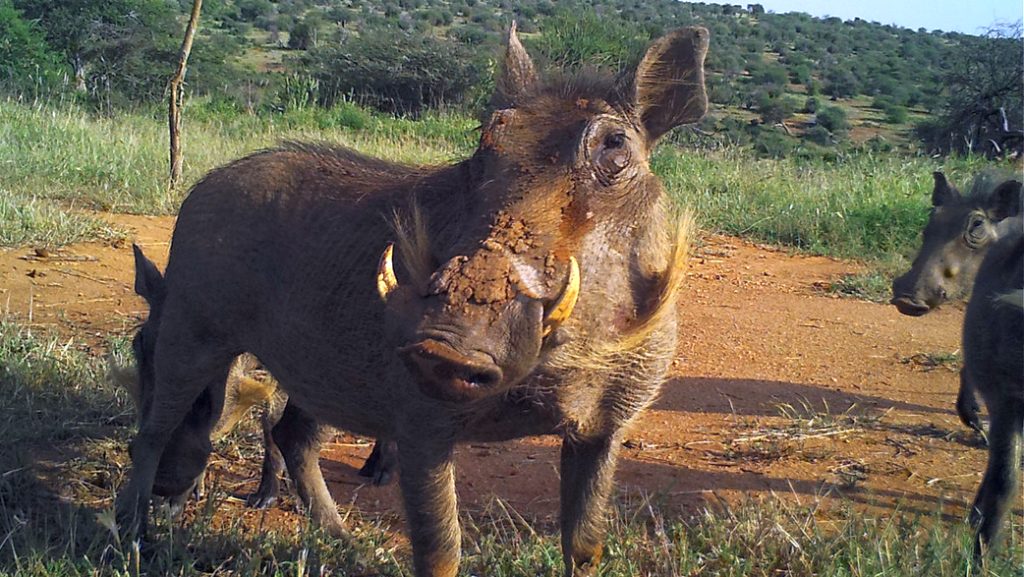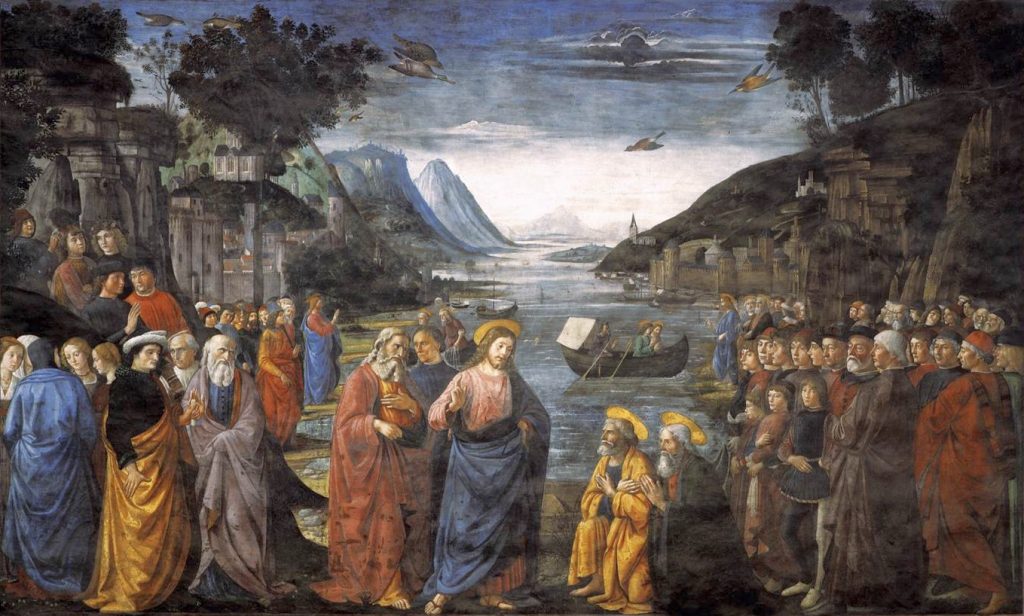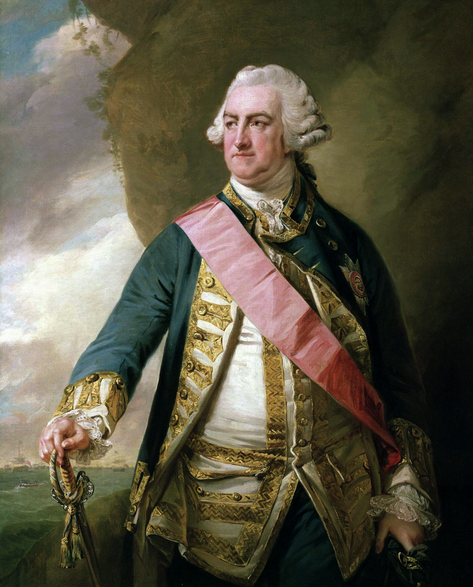Editor’s note: The following is extracted from My African Journey, by Winston Spencer Churchill (published 1909). All spelling in the original.
The town of Nairobi, the capital of the East Africa Protectorate, stands on the base of wooded hills at the three hundred and twenty-seventh mile of the railroad. Originally chosen as a convenient place for assembling the extensive depots and shops necessary to the construction and maintenance of the railway, it enjoys no advantages as a residential site. The ground on which the town is built is low and swampy. The supply of water is indifferent, and the situation generally unhealthy. A mile farther on, however, upon the rising ground a finer position could have been found, and this quarter is already being occupied sparsely by Government buildings, hospitals, and barracks. It is now too late to change, and thus lack of foresight and of a comprehensive view leaves its permanent imprint upon the countenance of a new country.
Our train traverses the Athi plains, more crowded perhaps with game than any other part of the line, and approaches swiftly the long rows of one-storeyed tin houses which constitute the town. Nairobi is a typical South African township. It might be Pietermaritzburg or Ladysmith of twenty years ago, before blue gum-trees and stone buildings had waxed and multiplied. In its present stage perhaps it resembles Buluwayo most. The population is also South African in its character and proportions. There are five hundred and eighty whites, three thousand one hundred Indians, and ten thousand five hundred and fifty African natives. The shops and stores are, however, much more considerable than these figures would appear to warrant, and are fully capable of supplying the varied needs of settlers and planters over a wide area. Nairobi is also the headquarters of a brigade of the King’s African Rifles, the central office and depot of the Uganda Railway, and the seat of the Administration, with its numerous official personnel. The dinner of the Colonists’ Association, to which I was invited, afforded the familiar, yet in Central Africa not unimpressive, spectacle of long rows of gentlemen in evening dress; while the ball given by the Governor to celebrate the King’s birthday revealed a company gay with uniforms, and ladies in pretty dresses, assembled upon a spot where scarcely ten years before lions hunted undisturbed.
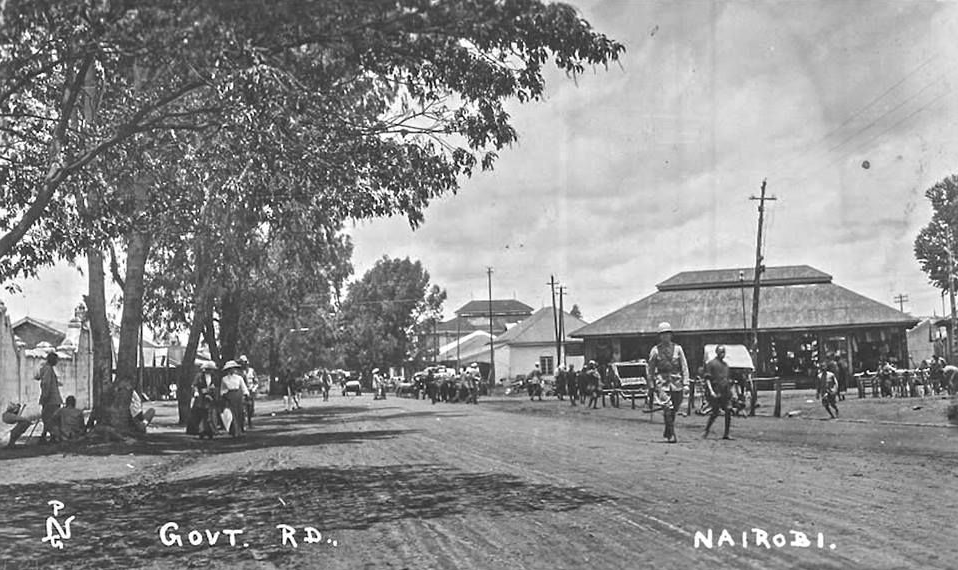
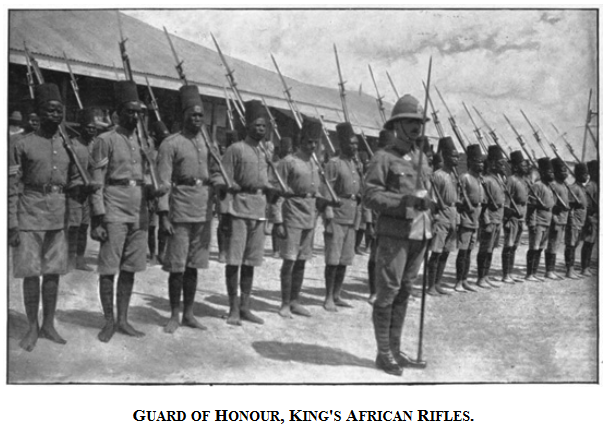
Every white man in Nairobi is a politician; and most of them are leaders of parties. One would scarcely believe it possible, that a centre so new should be able to develop so many divergent and conflicting interests, or that a community so small should be able to give to each such vigorous and even vehement expression. There are already in miniature all the elements of keen political and racial discord, all the materials for hot and acrimonious debate. The white man versus the black; the Indian versus both; the settler as against the planter; the town contrasted with the country; the official class against the unofficial; the coast and the highlands; the railway administration and the Protectorate generally; the King’s African Rifles and the East Africa Protectorate Police; all these different points of view, naturally arising, honestly adopted, tenaciously held, and not yet reconciled into any harmonious general conception, confront the visitor in perplexing disarray. Nor will he be wise to choose his part with any hurry. It is better to see something of the country, of its quality and extent, of its promises and forfeits, of its realities and illusions, before endeavouring to form even a provisional opinion.
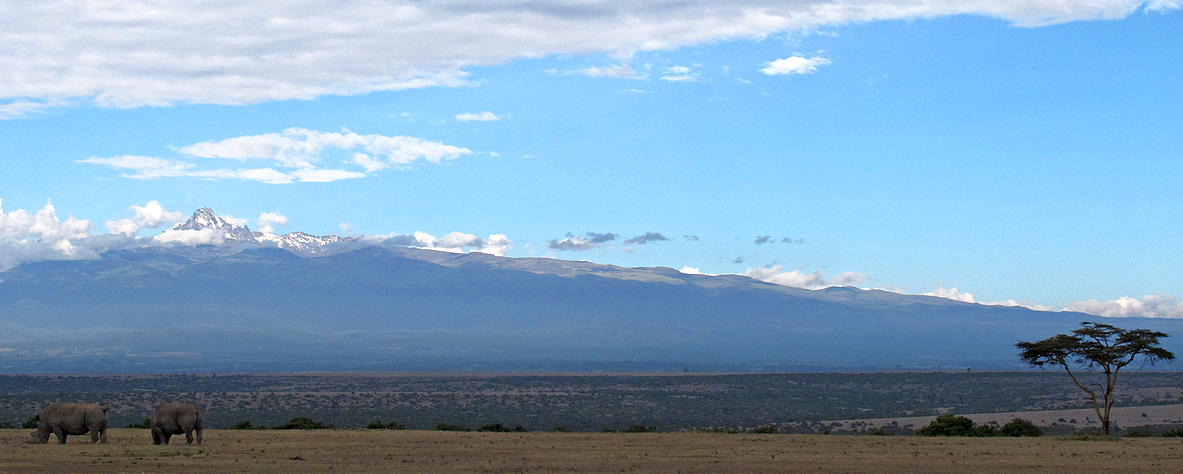
The snow-clad peak of Mount Kenya, a hundred miles away, can on a clear morning be easily seen from the slopes above Nairobi—a sharp, serrated summit veined with gleaming white. A road—passable, albeit unmetalled, for wagons and even a motor-car—runs thitherward by Fort Hall and across the Tana River. On the way there is much to see. A wild, ragged-looking, but fertile region, swelling into successive undulations and intersected by numerous gorges whose streams are shaded by fine trees, unfolds itself to the eye. Scattered about upon spacious estates of many thousand acres are a score or two of colonists, each gradually making himself a home and a living in his own way. One raises stock; another plants coffee, which grows so exuberantly in this generous soil as to threaten the speedy exhaustion of the plant. Here are ostriches, sheep, and cattle standing placidly together in one drove under the guardianship of a native child of eleven. There is a complete dairy farm, admirably equipped. One of the streams has been dammed effectively, and turbines are already in position to light Nairobi with electricity. Upon the banks of another there is talk of building an hotel.
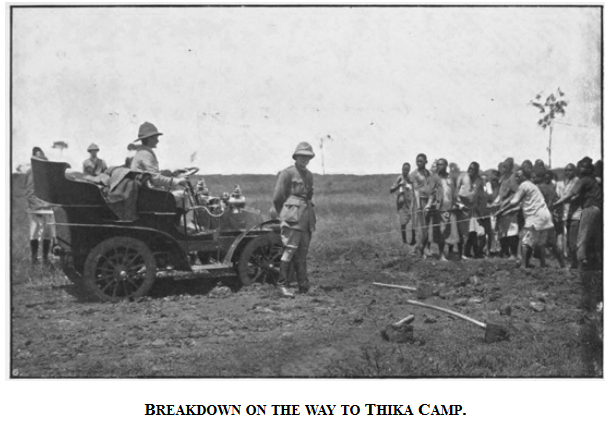
At one place I found a family of good people from Hightown, Manchester, grappling courageously with an enormous tract of ten thousand acres. Hard by, an old Boer, who has trekked the length of Africa to avoid the British flag, sits smoking stolidly by his grass house, reconciled to British rule at last by a few months’ experience of paternal government in a neighbouring Protectorate. He has few cattle and less cash, but he holds decided views as to the whereabouts of lions; there, moreover, stands the heavy tilted wagon of the Great Trek—an ark of refuge when all else fails; and for the rest there is plenty of game, few people, and the family grows from year to year. In short, one sees a sparse, heterogeneous population engaged in varied labours; but everywhere hard work, straitened resources, hopes persisting through many disappointments, stout hospitable hearts, and the beginnings, at any rate, of progress.
A camp has been prepared for me in a very beautiful spot at the juncture of the Chania and Thika rivers. Tents are pitched and grass shelters are erected in a smooth meadow. Southwards, a hundred yards away, a fine waterfall plunges downwards over enormous boulders amid tall, interlacing trees. The muffled roar of another rises from a deep ravine an equal distance to the north; and the Philistine computes, with a frown, four thousand horse-power expending itself upon the picturesque.
Nothing causes the East African colonist more genuine concern than that his guest should not have been provided with a lion. The knowledge preys upon his mind until it becomes a veritable obsession. He feels some deep reproach is laid upon his own hospitality and the reputation of his adopted country. How to find, and, having found, to kill, a lion is the unvarying theme of conversation; and every place and every journey is judged by a simple standard—”lions or no lions.” At the Thika camp, then, several gentlemen, accomplished in this important sport, have come together with ponies, rifles, Somalis, and all the other accessories. Some zebras and kongoni have been killed and left lying in likely-looking places to attract the lions; and at 4 a.m., rain or shine, we are to go and look for them.
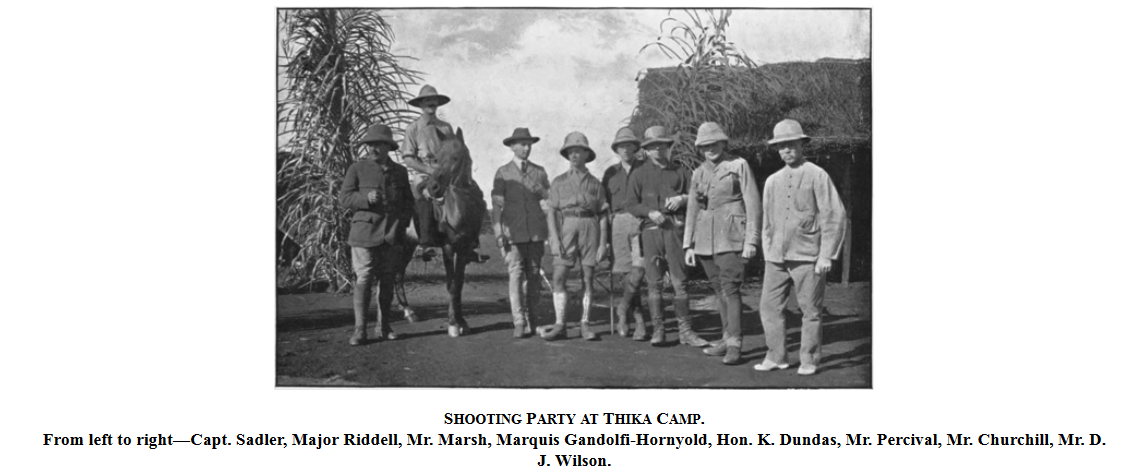
The young Englishman, be he officer or settler in the East African Highlands, cuts a hardy figure. His clothes are few and far between: a sun hat, a brown flannel shirt with sleeves cut above the elbow and open to the chest, a pair of thin khaki knickerbockers cut short five inches—at least—above the knee, boots, and a pair of putties comprise the whole attire. Nothing else is worn. The skin, exposed to sun, thorns, and insects, becomes almost as dark as that of the natives, and so hardened that it is nothing to ride all day with bare knees on the saddle; a truly Spartan discipline from which at least the visitor may be excused.
This is the way in which they hunt lions. First find the lion, lured to a kill, driven from a reed-bed, or kicked up incontinently by the way. Once viewed he must never be lost sight of for a moment. Mounted on ponies of more or less approved fidelity, three or four daring Britons or Somalis gallop after him, as in India they ride the pig—that is to say, neck or nothing—across rocks, holes, tussocks, nullahs, through high grass, thorn scrub, undergrowth, turning him, shepherding him, heading him this way and that until he is brought to bay. For his part the lion is no seeker of quarrels; he is often described in accents of contempt. His object throughout is to save his skin. If, being unarmed, you meet six or seven lions unexpectedly, all you need do—according to my information—is to speak to them sternly and they will slink away, while you throw a few stones at them to hurry them up. All the highest authorities recommend this.
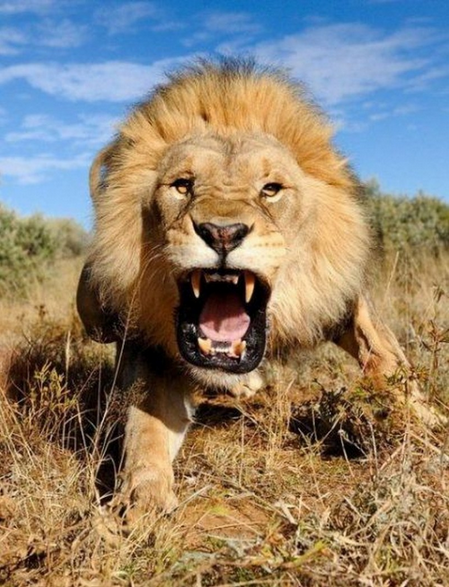
But when pursued from place to place, chased hither and thither by the wheeling horsemen, the naturally mild disposition of the lion becomes embittered. First he begins to growl and roar at his enemies, in order to terrify them, and make them leave him in peace. Then he darts little short charges at them. Finally, when every attempt at peaceful persuasion has failed, he pulls up abruptly and offers battle. Once he has done this, he will run no more. He means to fight, and to fight to the death. He means to charge home; and when a lion, maddened with the agony of a bullet-wound, distressed by long and hard pursuit, or, most of all, a lioness in defence of her cubs, is definitely committed to the charge, death is the only possible conclusion. Broken limbs, broken jaws, a body raked from end to end, lungs pierced through and through, entrails torn and protruding—none of these count. It must be death—instant and utter—for the lion, or down goes the man, mauled by septic claws and fetid teeth, crushed and crunched, and poisoned afterwards to make doubly sure. Such are the habits of this cowardly and wicked animal.
It is at the stage when the lion has been determinedly “bayed” that the sportsman from London is usually introduced upon the scene. He has, we may imagine, followed the riders as fast as the inequalities of the ground, his own want of training, and the burden of a heavy rifle will allow him. He arrives at the spot where the lion is cornered in much the same manner as the matador enters the arena, the others standing aside deferentially, ready to aid him or divert the lion. If his bullet kills, he is, no doubt, justly proud. If it only wounds, the lion charges the nearest horseman. For forty yards the charge of a lion is swifter than the gallop of a racehorse. The riders, therefore, usually avoid waiting within that distance. But sometimes they do not; or sometimes the lion sees the man who has shot him; or sometimes all sorts of things happen which make good stories—afterwards.
After this general description no particular example is required, and the reader need not be disappointed to learn that our lion escaped what, no doubt, would have been his certain destruction by the breaking of a single link in the regular chain of circumstances. He was not found upon the kill. His place was taken by a filthy hyena, and it was not until we had beaten thoroughly for two hours more than three miles of reed-bed that we saw him—a splendid great yellow cat, looking as big as a bullock—bounding away up the opposite hill. Off started our riders like falcons; but alas!—if “alas!” is the proper word—a deep and impassable nullah intervened, necessitating large circuits and long delays; so that the lion got clean away out of sight of all men, and we were reduced to the slow and tedious process of tracking him footprint by footprint through waving grass, breast-high, hour after hour, always expecting to tread on his tail, and always—disappointed!
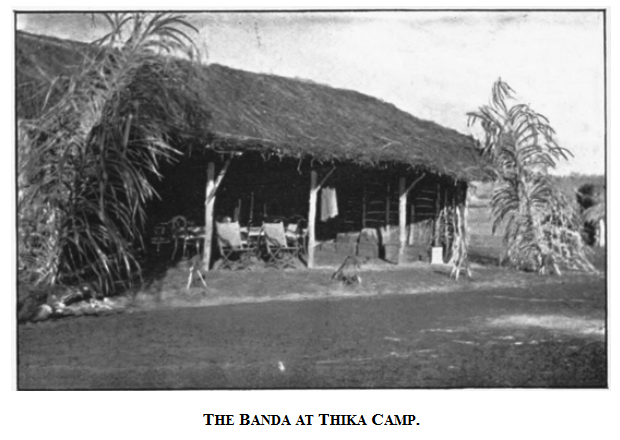

In the afternoon I had to ride to Fort Hall, where there was to be a great gathering of Kikuyu chiefs and thousands of their warriors and women. The country is much the same as that traversed on the previous day, but greener, smoother, and more pleasant-looking. Fort Hall is not a fort in any military sense, but the Commissioner’s house with a ditch round it, a jail, a few houses, and an Indian bazaar. The station is hardly well selected, being perched up on a hill out of the reach of any railway—and unhealthy nevertheless. The whole place was crowded with natives in their most highly ornamented and elaborate nudity, waiting for the war-dance.
This ceremony was performed the next morning. Long before daylight the beating of drums, the blowing of horns, and the rhythm of loud, yet not altogether unmelodious chanting awakened the weariest sleeper; and when, at eight o’clock the indaba began, the whole space in front of the fort was densely packed with naked, painted, plumed, and gyrating humanity, which seethed continually to and fro, and divided from time to time as particular chiefs advanced with their followers, or as gifts of struggling sheep and bulls were brought forward. In his war dress the Kikuyu, and, still more, the Masai warrior, is a striking, if not impressive, figure. His hair and body are smeared with the red earth of his native land, compounded into a pigment by mixture with the slimy juice of the castor-oil plant, which abounds. Fantastic headdresses, some of ostrich feathers, others of metal or leather; armlets and leglets of twisted wire; stripes of white clay rubbed across the red pigment; here and there an old pot-hat or some European garment, incongruously contrasted with leopard-skins and bulls’ horns; broad, painted cow-hide shields, and spears with soft iron blades nearly four feet long, complete a grotesque and indecorous picture. Still, there is a sleek grace about these active forms—bronze statues but for their frippery—which defeats all their own efforts to make themselves hideous. The chiefs, however, succeed in reducing themselves to regular guys. Any old, cast-off khaki jacket or tattered pair of trousers; any fragment of weather-stained uniform, a battered sun-helmet with a feather stuck lamely into the top of it, a ragged umbrella, is sufficient to induce them to abandon the ostrich plume and the leopard-skin kaross. Among their warriors in ancient gear they look ridiculous and insignificant—more like the commonest kind of native sweeper than the hereditary rulers of some powerful and numerous tribe.
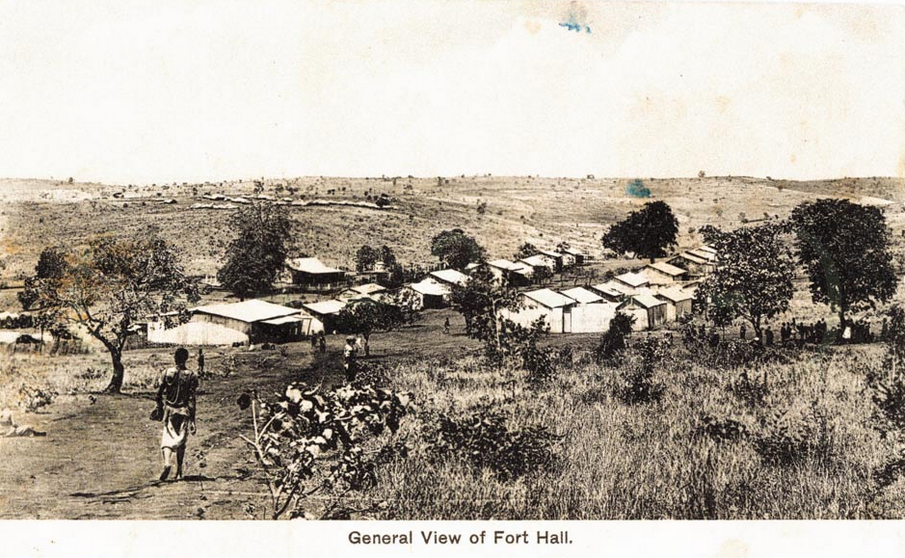
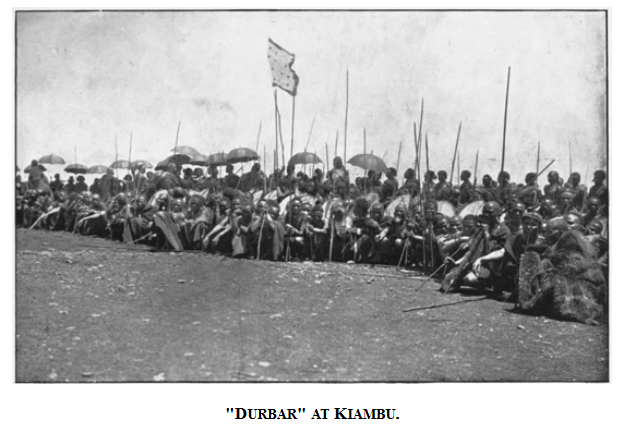
It is unquestionably an advantage that the East African negro should develop a taste for civilized attire. In no more useful and innocent direction could his wants be multiplied and his desires excited, and it is by this process of assimilation that his life will gradually be made more complicated, more varied, less crudely animal, and himself raised to a higher level of economic utility. But it would surely be worth while to organize and guide this new motive force within graceful and appropriate limits. A Government runs risks when it intrudes upon the domain of fashion; but when a veritable abyss of knowledge and science separates the rulers from the ruled, when authority is dealing with a native race still plunged in its primary squalour, without religion, without clothes, without morals, but willing to emerge and capable of emerging, such risks may fairly be accepted; and the Government might well prescribe or present suitable robes for ceremonial occasions to the chiefs, and gradually encourage, and more gradually still enforce, their adoption throughout the population.
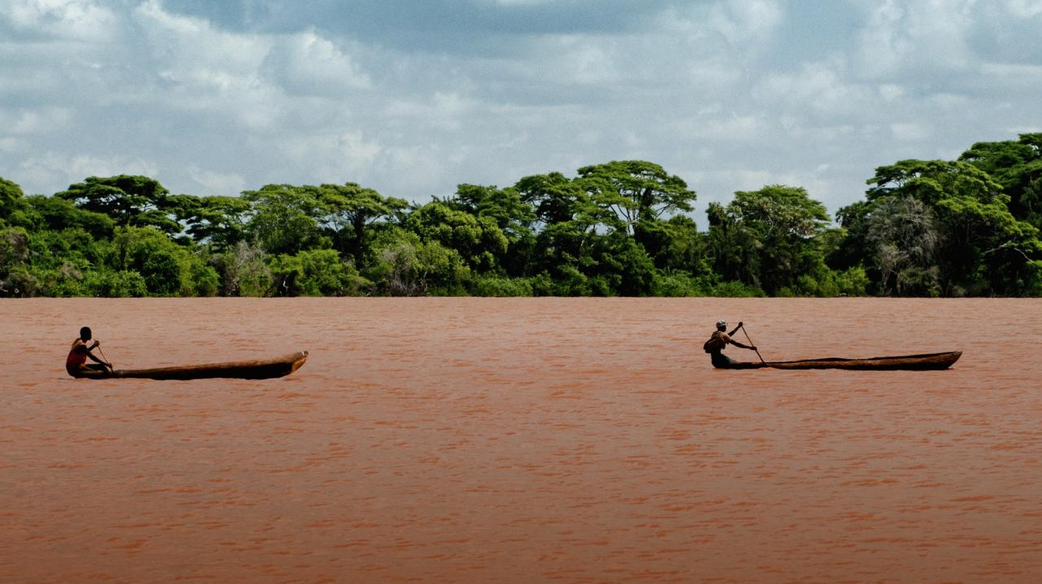
After the dance it had been arranged that I should go as far as the bank of the Tana River to see the view of Mount Kenya, and then return to the Thika camp before night. But when the whole splendid panorama of the trans-Tana country opened upon us, I could not bring myself to stop short of the promised land; and, casting away material cares of luncheon and baggage, I decided to ride through to Embo, twenty-eight miles from Fort Hall, and our most advanced post in this direction. We crossed the Tana by a ferry which travels along a rope under the impulsion of the current. The ponies swam the deep, strong, sixty-yard stream of turbulent red water. On the farther bank the country is really magnificent in quality and aspect. The centre of the picture is always Mount Kenya; but there never was a mountain which made so little of its height. It rises by long gentle slopes, more like a swelling of ground than a peak, from an immense upland plain, and so gradual is the acclivity that, but for the sudden outcrop of snow-clad rock which crowns the summit, no one would believe it over eighteen thousand feet high. It is its gradual rise that imparts so great a value to this noble mountain; for about its enormous base and upon its slopes, traversed by hundreds of streams of clear perennial water, there grows, or may grow, in successive, concentric belts, every kind of crop and forest known in the world, from the Equator to the Arctic Circle. The landscape is superb. In beauty, in fertility, in verdure, in the coolness of the air, in the abundance of running water, in its rich red soil, in the variety of its vegetation, the scenery about Kenya far surpasses anything I have ever seen in India or South Africa, and challenges comparison with the fairest countries of Europe. Indeed, looking at it with an eye fresh from Italy, I was most powerfully reminded of the upper valleys of the Po.

We rode on all day through this delicious country, along a well-kept native road, smooth enough for a bicycle, except where it crossed stream after stream on primitive bridges. On every side the soil was cultivated and covered with the crops of a large and industrious population. It is only a year since regular control was established beyond the Tana, not without some bloodshed, by a small military expedition. Yet so peaceful are the tribes—now that their intertribal fighting has been stopped—that white officers ride freely about among their villages without even carrying a pistol. All the natives met with on the road were armed with sword and spear, and all offered us their customary salutations, while many came up smiling and holding out long, moist, delicate-looking hands for me to shake, till I had quite enough of it. Indeed, the only dangers of the road appear to be from the buffaloes which infest the country, and after nightfall place the traveller in real peril. We were very glad for this reason, and also because we had eaten nothing but a banana each since early morning, to see at last on the top of the next hill the buildings of Embo just as the sun sank beneath the horizon.
Embo is a model station, only five months old—one small, three-roomed house for the District Commissioner, one for the military officer, an office, and a tiny jail, all in good dressed stone; two Indian shops in corrugated iron; and seven or eight long rows of beehive grass huts for a hundred and fifty soldiers and police. Two young white officers—a civilian and a soldier—preside from this centre of authority, far from the telegraph, over the peace and order of an area as large as an English county, and regulate the conduct and fortunes of some seventy-five thousand natives, who have never previously known or acknowledged any law but violence or terror. They were uncommonly surprised to see four horsemen come riding up the zigzag path to their dwelling; but their astonishment was no bar to their hospitality, and we were soon rewarded for our journey and our fasting in most excellent fashion.
I had just time before the darkness flooded the land and blotted out the mighty mountain and its wreaths of fire-tipped cloud to walk round this station. The jail consisted of a single room, barred and bolted. Inside not a prisoner was to be seen. I inquired where they were, and was shown two little groups seated round fires in the open. They were chained together by a light running chain, and after a hard day’s miscellaneous work about the station they chatted peacefully as they cooked and ate their evening meal. The prison was only their shelter for the night—primitive arrangements, no doubt, but are they more barbarous than the hideous, long-drawn precision of an English convict establishment?
The African protectorates now administered by the Colonial Office afford rare scope for the abilities of earnest and intelligent youth. A man of twenty-five may easily find himself ruling a large tract of country and a numerous population. The Government is too newly established to have developed the highly centralized and closely knit—perhaps too closely knit—hierarchy and control of the Indian system. It is far too poor to afford a complete Administration. The District Commissioner must judge for himself, and be judged upon his actions. Very often—for tropical diseases make many gaps in the ranks, and men must often return to England to recruit their health—the officer is not a District Commissioner at all, but a junior acting in his stead or in some one’s stead, sometimes for a year or more. To him there come day by day the natives of the district with all their troubles, disputes, and intrigues. Their growing appreciation of the impartial justice of the tribunal leads them increasingly to carry all sorts of cases to the District Commissioner’s Court. When they are ill they come and ask for medicine. When they are wounded in their quarrels it is to the white man they go to have the injuries dressed. Disease and accident have to be combated without professional skill. Courts of justice and forms of legality must be maintained without lawyers. Taxes have to be collected by personal influence. Peace has to be kept with only a shadow of force.
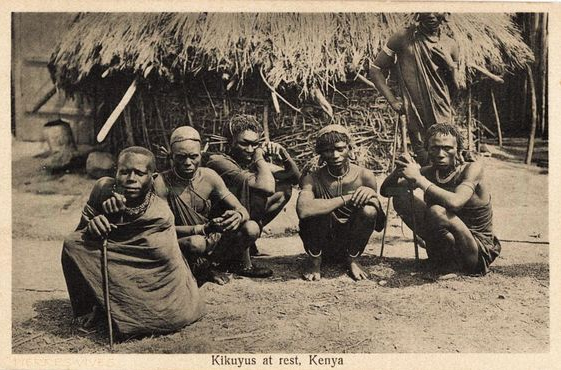
All these great opportunities of high service, and many others, are often and daily placed within the reach of men in their twenties—on the whole with admirable results. It was most pleasant to hear with what comprehension and sympathy the officers of the East Africa Protectorate speak about their work; and how they regard themselves as the guardians of native interests and native rights against those who only care about exploiting the country and its people. No one can travel even for a little while among the Kikuyu tribes without acquiring a liking for these light-hearted, tractable, if brutish 38 children, or without feeling that they are capable of being instructed and raised from their present degradation. There are more than four million aboriginals in East Africa alone. Their care imposes a grave, and I think an inalienable, responsibility upon the British Government. It will be an ill day for these native races when their fortunes are removed from the impartial and august administration of the Crown and abandoned to the fierce self-interest of a small white population. Such an event is no doubt very remote. Yet the speculator, the planter, and the settler are knocking at the door. There are many things which ought to be done—good, wise, scientific, and justly profitable. If the Government cannot find the money to develop the natural economic strength of the country, to make its communications, to start its industries, can it with any reason bar the field to private enterprise? Can it prevent the ingress of a white population? Ought it to do so, and for how long? What is to happen when there are thirty thousand white people in East Africa, instead of the three thousand or so who make so much stir at the present time? Perhaps the course of these chapters will lead us back again to these questions. I am very doubtful whether it will supply their answers.
We have a discussion in the evening on a much more manageable subject. The District Commissioner at Embo has been ordered by the High Court of the Protectorate to retry a criminal case which he had settled some months before, on account of an informality in the report of the proceedings, which had excited the attention of the revising authority. It is pointed out that neither the accused nor his fellow-natives understand, or can ever be made to understand, the meaning of this repetition of a trial; that they are bewildered; that their confidence in their personal ruler may be weakened; that endless practical difficulties—for instance, the collection of witnesses scattered about in distant villages, and the disquietude caused to them by a second summons from the strange, mysterious power called “Government”—arise out of an error which only a lawyer could detect, and which only appears upon a piece of paper. “Some one,” quaintly says a young civil officer, who has ridden over with us, “forgot to say ‘Bo!’ in the right place.” I ask the nature of the “Bo!” It is certainly substantial. No mention was made in the report of the trial that the accused was given the opportunity of cross-examining the hostile witnesses. Therefore, although this was in fact done, the trial is held to be no trial, and ordered anew.
Now, here is again a balancing of disadvantages; but without here examining whether a simple release would not have been better than a retrial, I find myself plainly on the side of the “Bo!” There is scarcely anything more important in the government of men than the exact—I will even say the pedantic—observance of the regular forms by which the guilt or innocence of accused persons is determined. Those forms are designed to protect the prisoner, not merely from the consequences of honest forgetfulness in his judges, but from systematic carelessness and possible oppression. Once they are allowed to be loosely construed the whole system of civilized jurisprudence begins to crumble, and in its place there is gradually erected a rough-and-ready practice dependent entirely for its efficiency and fairness upon the character and intelligence of the individual responsible. Necessary as it is to trust to personal authority in the control of native races of the lowest standard, it is not less necessary to assign well-marked limits to that authority, and, above all, to place the simple primary rights of accused persons to what we at home are accustomed to call a “fair trial” outside its scope. Nor does the administrator really suffer in native eyes from the apparition into his domain of superior authority. The tribesmen see that their ruler—to them all-powerful, the man of soldiers and police, of punishment and reward—is himself obedient to some remote external force, and they wonder what that mysterious force can be and marvel dimly at its greatness. Authority is enhanced and not impaired by the suggestion of immense reserves behind and above the immediate ruler—strong though he be. But upon this, as upon other matters, it is not necessary for every one to be of the same opinion; and even lawyers are not always wise.
On our homeward ride in the early morning we passed a Swahili village. These Mohammedans have penetrated deeply and established themselves widely in the Eastern parts of Africa. Armed with a superior religion and strengthened with Arab blood, they maintain themselves without difficulty at a far higher level than the pagan aboriginals among whom they live. Their language has become a sort of lingua franca over all this part of the world. As traders they are welcomed, as fighting men they are respected, and as sorcerers they are feared by all the tribes. Their Khan had supplied us with bananas on the previous day with many expressions of apology that, as we were unexpected, he had no “European food.” To-day all this was repaired. The men of the village, to the number of perhaps fifty, walked sedately out to meet us, their long white smocks in striking contrast to the naked, painted barbarians who surrounded them. The Khan led up a white Arab stallion, of vicious temper and tripling gait, to replace my wearied pony; and then produced tea and a familiar tin of mixed biscuits, which he had over-night sent runners to procure, that his hospitality might incur no reproach.
While we were eating and parleying with the Khan there arrived on the scene a mounted Kikuyu chief, with chair, umbrella, khaki helmet, and other insignia, and attended by about a hundred warriors in full feather. In order to show their respect they began at once their war-dance, and we left them a quarter of an hour later still circling and hopping to and fro with quivering spears and nodding plumes to their monotonous chorus, while the white-robed Swahilis stood gravely by and bade us farewell in the dignified manners of the East. I reflected upon the interval that separates these two races from each other, and on the centuries of struggle that the advance had cost, and I wondered whether that interval was wider and deeper than that which divides the modern European from them both; but without arriving at any sure conclusion.
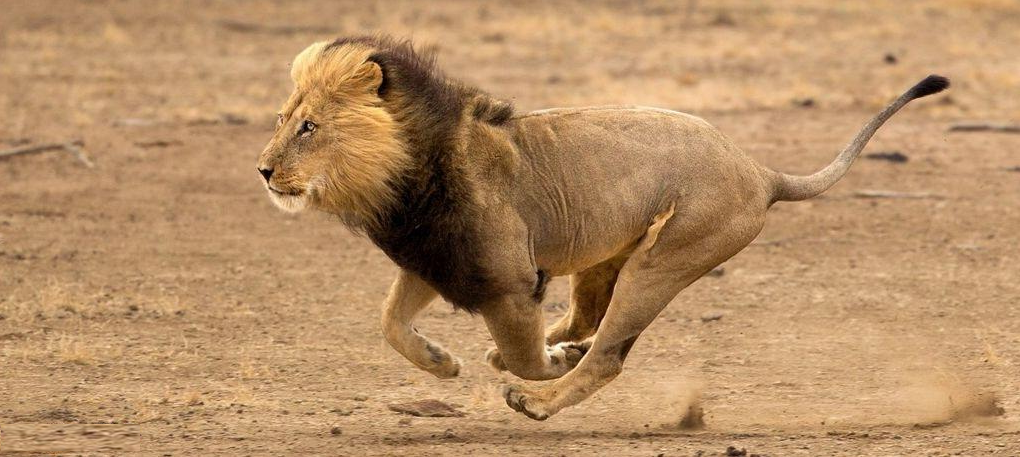
Our journey to Embo had been so delightful that I was not inclined to hanker after rejected alternatives. But when we drove in to the Thika camp as the sun was setting, tired out by fifty miles of road, the first spectacle which saluted my eyes was a lion’s skin spread out upon the ground and Colonel Wilson engaged in sprinkling it with arsenical powder. Then we were told the tale, which in brief was that they were driving a long reed-bed, when the lion sprang out and ran obliquely across the line of beaters. Wilson fired and the lion bounded back into the reeds, whence stones, fires, shoutings, shots, and all other disturbances failed to move him. Whereupon, after two hours, being impatient and venturesome, they had marched in upon him shoulder to shoulder, to find him, fortunately, quite dead.
My friends endeavoured to console me by the news that lions had now been heard of in two other places, and that we should be sure to find one in the morning; and next day, after we had driven three miles of reeds, it seemed that their hopes were well founded, for a large animal of some kind could be seen moving swiftly to and fro under cover, and every one declared this must be the lion. At last only one more patch of reeds remained to beat, and we took up our positions, finger on trigger, about sixty yards from the farther edge of it, while the beaters, raising an astonishing tumult with yells and the beating of tin cans, plunged boldly in. Parturiunt montes—out rushed two enormous wart-hogs. Let no one reproach the courage of the pig. These great fierce boars, driven from their last shelter, charged out in gallant style—tusks gleaming, tails perpendicular—and met a fate prepared for a king. With these and another which we galloped down and pistolled on the way home I had to be content, and can now, so far as I am concerned, sadly write, in the expressive words of Reuter, “No lions were ‘bagged.'”

